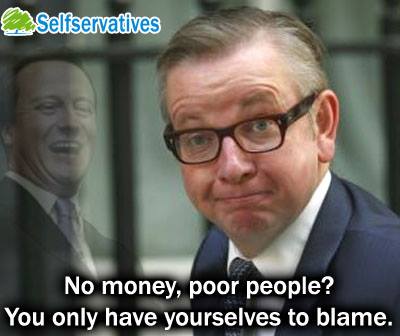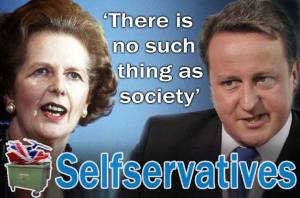
Iain Duncan Smith told delegates at the Tory conference in Birmingham: “I have long believed that where parents have fallen into a damaging spiral – drug or alcohol addiction, even problem debt, or more – we need to find ways to safeguard them – and more importantly, their families, their children, ensuring their basic needs are met.
Benefits paid should go to support the well-being of families, not “to feed their destructive habits”.
Work and Pensions Secretary Iain Duncan Smith proposed that a “smartcard” scheme would see benefit payments loaded onto prepaid cash cards, and that transactions would be automatically stopped if people tried to buy anything on them but essentials. Again.
Smart Cards entered our collective consciousness during autumn 2012, as Iain Duncan Smith declared his intention to attempt to discipline Britain’s “troubled” families. In unveiling his proposals at the Conservative Conference back in October 2012, Duncan Smith attempted to frame the cards as better value for taxpayers’ money, implying that poor people don’t pay taxes, (when we actually pay proportionally more) and his rhetoric stigmatised all benefit claimants: I am looking […] at ways in which we could ensure that money we give [benefit claimants] to support their lives is not used to support a certain lifestyle.
MP Alex Shelbrooke presented his (rejected) private member’s bill in December 2012, providing us with yet another shuddering glimpse into the underlying Tory moral outrage and punitive attitudes towards people claiming benefits. He argued for a “welfare cash card” to limit spending to absolute basics. Despite his scapegoating narrative about addressing “idleness”, Shelbrooke’s restrictions were intended to apply to those in work, who claim benefits such as tax credits and housing benefit, thus penalising and stigmatising those on a minimum or low wage, also.
A principled objection is that we should not be stigmatising people and reducing their freedom to spend money as they wish just because they are forced to spend some time out of work, or because they aren’t paid a wage that is sufficient to live on.
And having been previously rejected, this is certainly not a democratically endorsed policy.
This is an authoritarian restriction on what people claiming benefits can buy, and is a particularly spitefully directed ideological move that does not make ANY sense in terms of the wider economy, or in terms of any notion of “supporting” people, and “fairness.” The latter two categories of reason would entail extending opportunities and freedoms, not repressing them. Financial hardship already limits choice. When people are struggling financially, budgeting isn’t the problem: low wages, benefit cuts and rising costs of essentials are. Those factors are shaped by government policies, not poor people.
And no matter how this is semantically dressed up by the Tories, poor people don’t respond to “corrective” narratives and policy like Pavlov’s dogs. Yet the Tories nevertheless insist on placing a pseudo-psychological variant of operant conditioning – behaviour modification – at the core of their psychopathic control freakery repressive rhetoric. This isn’t about state “assistance” for the entitled poor. It’s about state interference and intrusion. And more blaming and punishing the victim.
The Tories have historically thought that poor people “deserve” to have their rights and freedoms curtailed, so that their corporate whores can profit.Tory policies create and sustain inequality because they have an underpinning Social Darwinist philosophy at their core, which is masqueraded as meritocracy.
Restrictions on spending will mean that money is being removed from the wider economy. Limiting “consumer choice” and spending flies in the face of the Tories own free market dogma, after all.
Furthermore, as it stands legally, the government cannot currently stipulate how people claiming benefits spend their money.
The sheer pace and blatancy of Cameron’s austerity program – a front for the theft and redistribution of public wealth to Tory donor private company bank accounts – is unprecedented, even for conservatives.
When the state makes judgements about what constitutes a necessity, and then enforces this on the poorest and most vulnerable citizens, it creates a “peasant” and “benevolent dictator” dichotomy. This is not democratic, progressive or ethically sound.
Conservatives claim to believe in personal responsibility, limited government, free markets, individual liberty, traditional values and a strong national defence. They believe the role of government should be to provide people the freedom necessary to pursue their own goals. Conservatives claim their policies generally emphasise “empowerment of the individual to solve problems”. So how does any of this tally with welfare cuts and prepaid cards, the removal of human rights, removal of access to legal aid, limiting housing options for the poorest, and the welfare “conditionality” and sanction regime, for example?
As Christine Clifford pointed out: “This is an interpretation of the individual based on an ideology bereft of informed knowledge of human beings and their need for social connection and interdependence.”
Article One of the Declaration of Human Rights recognises our fundamental social context, it says: “All human beings are born free and equal in dignity and rights. They are endowed with reason and conscience and should act towards one another in a spirit of brotherhood.”
All Tory policy aimed at the poorest is a direct attack on equality, dignity and human freedom. It also aims at segregating and stigmatising the most vulnerable social groups.
The welfare state is a safety net to which we all contribute so that if circumstance dictates, we may use it: something those least likely to ever need it conveniently forget. When the state start incorporating punitive addendums, we lose sight of the wider issue. The poor have been deliberately stigmatised through a caricature of “scrounging, recklessness and fecklessness.”
Something that troubles me greatly is that the Tory definition of “troubled family” conflates poverty, ill health, unemployment and criminality. Iain Duncan Smith claims to be targeting substance abusers (“drug addicts” and “alcoholics”) but it’s clear that the government’s definition means he’s referring largely to the poor and disabled people. His proposal to deal with people who don’t buy their children food because they’re “drug addicted” would actually target people who don’t buy food because they can’t afford it.
And of course, once again we see the disciplinarian Tories blaming and stigmatising vulnerable people for the conditions that Tory policies have caused. If such “troubled families” existed families (and the Joseph Rowntree foundation research has put paid to the myth of “families with three generations unemployed” ), it would not be reasonable to treat their situations as an issue of personal spending choices rather than a consequence of how our economy is run.
The Tories have, over the past four years, parodied a political process that is supposed to be about engaging the public’s rational, conscious minds, as well as facilitating their needs within society. Instead we see the employment of psychobabble and behaviourism by right-wing authoritarians, the former to appeal with a superficial authority directly to people’s irrational, primitive impulses which have little apparent bearing on issues outside of their own narrow self-interest, and the latter to manipulate and control them. The media are complicit in propping up an increasingly incoherent, irrational and phenomenologically violent ideology.
Tory policies have imposed increasingly damaging, punitive restrictions on the freedoms and limitations on choices available to our poorest and most vulnerable citizens. As well as having a determination to control and restrict every dimension of poor people’s lives, the oppressive Tories – those lying minarchists – intrude on an intimate psychological level, repressing, brutalising people’s very sense of self and assaulting their dignity with labels of loathing, with a constant monologue of hatred, a vicious contempt and pitiless, sadistic scorn. I can see it, I can feel it and I can hear it.
And these are not the actions of a democratic government.
 Many thanks to Robert Livingstone for his excellent pictures
Many thanks to Robert Livingstone for his excellent pictures


Reblogged this on sdbast.
LikeLike
I concede with your comments above about how the Tories treatment of the poor effects them in the end, as their businesses & the whole economy is based on the buying power of every class. I recently read an article about Tesco’s loss in profits was more to do with people not having money than marketing assumptions. The Tories are Neoliberalism at its worst and what’s even worse: they are too dumb to see what they do to the poor effects them in the end.
LikeLike
Reblogged this on Britain Isn't Eating.
LikeLike
Reblogged this on markcatlin3695's Blog.
LikeLike
A particularly biting and accurate assessment. Very well said!
LikeLike
Thanks Robin x
LikeLike
Reblogged this on glynismillward189.
LikeLike
I suggest the biggest challenge to these fascists would be to identify what part / proportion / cash equivalent for every individual for each of the basics allegedly covered by the benefit is to be put on these cards.
e.g. Is it for food? Then how much does the calculation show is allotted for food in the current benefit? Will that amount be guaranteed to provide adequate nourishment & calories? Or will it be the amount left after all deductions, which as we know is as little as £10 each pw for food, Could they still try & claim those on benefits simply have a money management issue? Or would it serve to show the savagery of the bedroom tax? (This would have to be repeated for every basic to be covered.)
Like UC, this is one can of worms of their own making. Depressingly, it wouldn’t stop them from trying. would it? After all £2.8 billion has been spent on UC so far – for nothing – which is remarkably similar to the £3 billion cuts promised for the already poor. Sometime, looking at the DWP fag-packet calculations, and the naked contempt for us I am sadly reminded of Chinese executions, where the family are charged for the bullet.
LikeLike
Reblogged this on Beastrabban’s Weblog and commented:
Something like this has been mooted for a very long time. Back in the 1990s various countries experimented with the ‘electronic bourse’, a smart card, which would allow people to pay without cash. The result was disastrous. The French eventually abandoned it, and the combined biometric ID card, hyped by the Indonesian government as ‘unbreakable’ was also, er, broken. Within three weeks of launch, counterfeit cards were being produced on the Indonesian black market.
LikeLike
Reblogged this on amnesiaclinic and commented:
The movement towards smart cards and controlling what claimants spend and where is the first step in having a subcutaneous chip that will control everything including emotions and thought – and whether you live or die.
The end result a fascist slave world where there are only 2 classes – the very, very rich and the slaves.
LikeLike
Reblogged this on eclectictaste18.
LikeLike
Once I had interpreted the article into readable English, I realised the one thing that the “decent” family would need cash for is one that never seems to be accounted for – treats for the kids or, as in my case, the grandchildren. Would schools take these cards in payment for tickets to School Plays, would the local theatre take the card in payment for tickets to watch children or grandchildren in dance or stage school shows?
There are too many items that need paying for in cash. None of these many items include illegal drugs or alcohol (apart from social drinking with meals). This is yet another thing that the Tories have decided will happen and have not put enough thought into. Still, come May, they won’t be around (I hope).
LikeLike